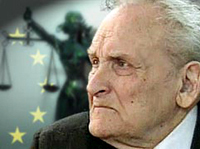European Court of Human Rights Humiliates Soviet War Veteran
Soviet veteran guerilla fighter Vasily Kononov had lost the case in the European Court of Human Rights to Latvian officials. On May 17, the information was released that the Court satisfied Latvia’s appeal which upheld previous conviction of Kononov.

The story began in 1998. The former partisan was arrested by Latvian officials for war crimes during World War II. He was convicted of elimination of local policemen who assisted Nazis. Latvian investigators have proved that in 1994 Kononov was in charge of the operation in Malye Baty village and ordered to “unlawfully” shoot nine local policemen who earlier had eliminated a Soviet guerilla division.
Russia Today: Russia protests Strasbourg court decision against Soviet WWII veteran
In 2000, Kononov was sentenced to 18 months of imprisonment. After the sentence he was sent home since he had spent the required time in jail. In 2001, he was sentenced to six years in prison. The guerilla appealed, and the case was sent for additional investigation. In April of 2004 the Supreme Court of Latvia sentenced him to 20 months in prison for “war crimes.” Immediately after, Kononov’s attorney submitted a claim to the European Court of Human Rights.
It seemed that after long years of struggle against Latvian officials fairness has finally won. In 2008 the European Court of Human Rights recognized that the actions of Riga were illegitimate. In January of 2009 Latvia filed an appeal. In late April of 2010 the upper chamber of the court cancelled the decision of lower chamber that ruled the sentence of Latvian officials illegitimate (basing their decision on article 7 of the European Convention of Human Rights). The information regarding the decision was released just now. Representatives of the European Court of Human Rights kept silence nearly a month.
The Russian Ministry of Foreign Affairs called the decision of the European court a dangerous precedent. “We consider the decision of the upper chamber not only a review of the fair decision of the chamber made on June 24, 2008, but an attempt to doubt a series of key political and legislative principles formed as a result of World War II and after-war settlement in Europe, including making Nazi war criminals responsible.
Eliminating the responsibility of Latvia, upper chamber virtually agreed with those who strive to reconsider the results of World War II and embellish Nazi and their accomplices. The ruling of the court means justification of Nazi and their allies and will provoke further growth of revanchists in Europe, as well as pro-Nazi and extreme national-radical forces,” the official statement of the Russian MFA says.
Russian officials stress that “the decision in Kononov’s case seriously damages the authority of the European Council and can be considered the intention to draw new dividing lines in Europe. It is the intention to destroy the consensus regarding all-European values and standards.
The Russian Federation that participated in Kononov’s case as a third party, after overall assessment of the ruling and its legislative consequences, will make respective conclusions, including those regarding building further relations with the Court and European Council in general,” the document stresses.
Kononov still has a chance to have his case reviewed. Article 80 of the Strasburg Court Reglament allows for a review of the decision made by the upper chamber in the event the losing party provides evidence that was earlier unavailable to the court but important for the process.
Why has the European Court of Human Rights made this ruling? What will the consequences be? Konstantin Zatulin and Vyacheslav Nikonov talked to Pravda.ru about it.
"I am afraid this decision may make the Baltic countries prosecute veterans even more. The ruling will have consequences, “says Konstantin Zatulin, Director of the Institute of CIS countries. “The State Duma should express their opinion on the matter and I will insist that the members of Duma react. The decision of t he Strasburg Court is a political one. Its judges based their decision on the desire to protect Latvia from alleged pressure from Russia. Many emotional people in the West still see Russia as the “scary USSR” that oppressed Latvia and other national republics.
Why the European Court of Human Rights reconsidered its previous verdict? Mainly because Latvia decided that the decision supporting Kononov destroys its institutions. This is the example of obvious pressure. The judges of the European Court united with the courts of Latvia who prosecute Soviet veterans and protect Nazi.
Kononov is prosecuted for fighting for his motherland. He is convicted of eliminating people who helped Hitler. It is not Kononov’s fault that Nazi and their allies in Latvia launched a national war.
Russia never had warm relations with the European Court of Human Rights . We spread out jurisdiction on their territory. In some ways it has a positive effect. Our citizens who cannot have their rights protected here address the court. But this positive effect is eliminated by the political bias seen in cases like Kononov’s.
I personally addressed this body. In 2006 I addressed the court because the Ukrainian President at the time, Victor Yushchenko,ordered to ban me from entering Ukrainian territory. I went through all stages required for filing a case to the European Court of Human Rights . My claim was sitting there for 18 months, and then I was told, without the right for an appeal, that my claim will not be considered.
It was a winning case in all respects. Yet, the judges of t he Strasburg Court did not want to announce a verdict that would be unpleasant for Yushchenko. This is why the case was not reviewed, which is a violation for the court itself. This is the same case . After this ruling I have no faith in fairness and objectivity of the European Court of Human Rights . Today, I am asking myself: should we cooperate with them at all?" the member of the government said.
"This is outrageous, hypocritical and emotionally unpleasant political case,” said Vyacheslav Nikonov, president of the funds “Politika” and “Russky Mir.” “The decision was made in the end of April. Yet, it was not revealed on the eve of the Victory day so their actions would not look like a challenge. This is another expression of double standards . We all know the way veterans are treated in Baltic countries. Now we see another sign of their prosecution. Of course, we can express our disagreement and stress that this is a political case. But we cannot change the court decision. At any rate, it will be a blow to our cooperation with this body. Yet, I do not think we will break our relations with them over this case,” the expert believes.
Sergey Balmasov
Pravda.Ru
Subscribe to Pravda.Ru Telegram channel, Facebook, RSS!




